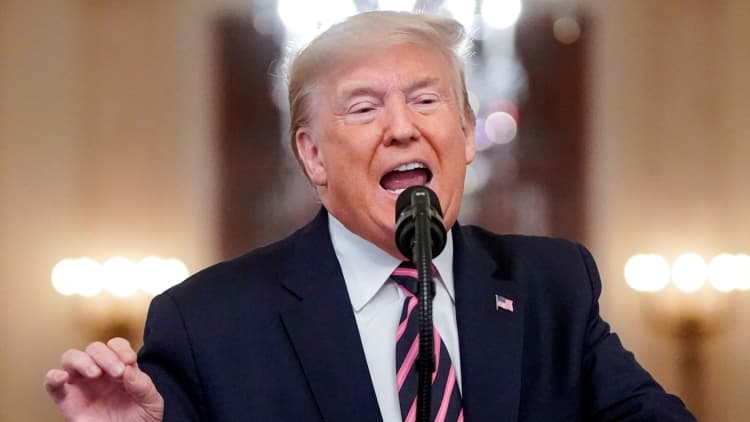A federal appeals court on Friday ordered the dismissal of a lawsuit by congressional Democrats who claim President Donald Trump has violated the Constitution's emoluments clause by allowing his businesses to receive money from foreign governments without prior approval of Congress.
Individual members of Congress lack legal standing to sue the president for alleged violations of law, said the three-judge panel of the U.S. Court of Appeals for the District of Columbia Circuit in a unanimous ruling Friday.
The appeals panel did not decide the question of whether Trump had violated the emoluments clause.
Trump told reporters on the White House lawn that the decision was "a total win." He called the Democrats' suit "another phony case."
Democrats who had pressed the case said they were disappointed, but also said that they were reviewing their legal options.
The case is just one of three lawsuits challenging Trump for alleged violations of the emoluments clause in connection with revenue from foreign governments and their officials who patronize his hotels and other businesses.
Friday's decision does not affect those other two cases, which were filed by a public interest watchdog group in one instance, and by the attorneys general of Maryland and the District of Columbia in the other.
Ultimately, the U.S. Supreme Court might be asked to decide the question of whether Trump has been violating the emoluments clause during his presidency.
Trump, upon becoming president, gave day-to-day control of his Trump Organization his two adult sons, Donald Jr. and Eric, who oversee the firm's portfolio of hotels, resorts and golf clubs.
But Trump still has ownership over the company.
Trump was acquitted by the Senate on Wednesday after his impeachment by the House in connection with claims that he had abused power by asking the newly elected president of Ukraine last summer to announce investigations of former Vice President Joe Biden and his son Hunter Biden, while withholding military aid to Ukraine that Congress had appropriated.
In the July 25 phone call that was a key piece of evidence against Trump, Ukraine President Volodymyr Zelenskiy told Trump that the "last time I traveled to the United States I stayed in New York near Central Park and I stayed at the Trump Tower." Trump has denied any wrongdoing.
The decision by the D.C. Circuit Court of Appeals came two months after the panel appeared deeply skeptical of the claim that members of Congress, as opposed to Congress itself, could sue a president for violating the law.
"You are not Congress," Judge Thomas Griffith told a lawyer for the 215 members during oral arguments in December.
"You are not here representing Congress," Griffith said.
In their decision Friday, Griffith and the other two judges on the panel, Karen LeCraft Henderson and David Tatel, underscored that fact.
"Here ... our conclusion is straightforward because the Members — 29 Senators and 186 Members of the House of Representatives — do not constitute a majority of either body and are, therefore, powerless to approve or deny the President's acceptance of foreign emoluments," the panel said in the ruling.
The judges cited a 1997 Supreme Court decision in a case known as Raines v. Byrd.
In that opinion, the high court ruled that individual members of Congress lacked standing under Article III of the Constitution to file a suit challenging a law which granted the president power to veto individual tax and spending measures after signing them into law.
Friday's decision also cited a Supreme Court opinion written last year by Justice Ruth Bader Ginsburg, in an appeal by Virginia's state House of Representatives involving a racial gerrymandering ruling.
The Supreme Court in that opinion noted "that 'individual members' of the Congress 'lack standing to assert the institutional interests of a legislature' in the same way 'a single House of a bicameral legislature lacks capacity to assert interests belonging to the legislature as a whole.'"
The D.C. Circuit, in its ruling Friday, said the Democratic "members can, and likely will, continue to use their weighty voices to make their case to the American people, their colleagues in the Congress and the President himself, all of whom are free to engage that argument as they see fit."

"But we will not — indeed we cannot — participate in this debate," the ruling. "The Constitution permits the Judiciary to speak only in the context of an Article III case or controversy and this lawsuit presents neither."
House Judiciary Committee Chairman Jerry Nadler, a New York Democrat who was one of the plaintiffs in the lawsuit, said, "While I am disappointed in the outcome of today's decision, a technical dismissal in no way condones President Trump's continuing violations of the Foreign Emoluments Clause of the Constitution."
"The Founders recognized the dangers of foreign influence and corruption, and President Trump embodies those fears every day as he profits off of his presidency," Nadler said. "We are reviewing our options, and we will continue to ensure that this President is held accountable to the Congress, to the Constitution, and to the American people.
Another plaintiff, Sen. Richard Blumenthal, D-Conn., called the decision "dismaying," but also noted that it "was not a decision on the merits of our allegations that President Trump has been defying the Foreign Emoluments Clause."
The 4th Circuit Court of Appeals in Richmond, Virginia, currently is considering whether to resurrect a suit by the attorneys general of Maryland and the District of Columbia, who are suing Trump over payments to his Washington hotel by foreign governments.
In September, a three-judge panel on the 2nd Circuit Court of Appeals in New York City revived a lawsuit filed by the watchdog group Citizens for Responsibility and Ethics in Washington accusing Trump of violating the emoluments clause.
Trump in October requested a rehearing in the case by the entire panel of judges on the 2nd Circuit.


